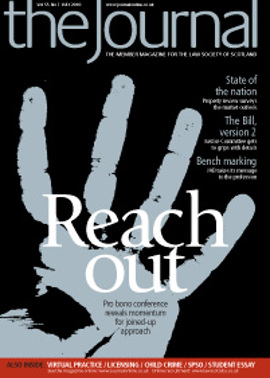Law reform update
Legal Services (Scotland) Bill
Stage 2 of the bill is now complete. A considerable number of amendments were debated and a number of points which the Society had previously raised with both civil servants and MSPs were taken on board.
The most significant of these include: the addition of the promotion of the interests of justice to the regulatory objectives; the addition of client confidentiality and ethical behaviour to the professional principles; an enhanced role for the Lord President in the appointment of approved regulators; a requirement for at least 51% of licensed legal services providers to be owned, managed and controlled by solicitors or other regulated professionals; and the creation of a regulatory scheme for will writers.
Stage 3 will commence in September after the Scottish Parliament’s summer recess. For more information, go to the ABS section on the Society’s website or email katiehay@lawscot.org.uk .
Children’s Hearings (Scotland) Bill
The stage 1 report was published on 9 June. The Education and Lifelong Learning and Culture Committee identified a number of specific issues that it thought required to be given further consideration, including the role and powers of the National Convener, the definition of a relevant person and the child confidentiality provision, but recommended to the Parliament that the general principles of the bill be agreed.
The bill was passed at the stage 1 debate on 16 June. The Society’s Family Law Subcommittee raised a number of concerns in relation to the bill in its response to the initial call for evidence and intends to raise them in more detail at stage 2, which will begin in September.
Registration of company charges
The Company Law Subcommittee recently responded to the Department for Business Innovation and Skills consultation which makes proposals to revise the current scheme for the registration of company charges.
The consultation considers what charges should be registrable, time limits for registration, and the consequences of both registration and of the failure to register, as well as registration procedures. The UK Government aims to provide a response to the consultation by the end of September.
Proposed Long Leases (Scotland) Bill
The Scottish Government is consulting on a bill to protect the interests of tenants under residential ground leases of more than 175 years’ duration who are potentially at risk of losing their homes, by converting the tenancies to outright ownership. This will complete the process of land reform which began with feudal abolition. The Conveyancing Committee’s response recommends the exclusion from the bill of long leases of strips of land creating wayleaves for pipes and cables, and of substations and other public facilities.
It also suggests some form of mechanism to consider applications for conversion to outright ownership of the tenant’s interest in certain leases which would not qualify as long leases.
Double jeopardy consultation
The Scottish Government considers that there should be an exception to the rule of double jeopardy on the basis of tainted evidence or a subsequent confession. This follows Scottish Law Commission recommendations.
The consultation paper considers only whether there should be an exception on the basis of new evidence. The Criminal Law Committee has responded on the basis that there should be a new evidence exception, where such evidence is compelling.
Consultation: self-directed support
The Mental Health and Disability Law Subcommittee and the Employment Law Subcommittee have jointly responded to this Scottish Government consultation. The proposals set out in the consultation aim to give people who receive social care services more choice and control, including direct payments, allowing them to purchase their own services. In their response, the committees were supportive of the principles behind the proposals and recognised the value in giving individuals greater autonomy. However, they also outlined some serious concerns about the implications of the proposals, particularly in the area of employment law.
A number of law reform committees are also currently considering responses to the following bills and consultations: the Criminal Sentencing (Equity Fines) (Scotland) Bill, the Domestic Abuse (Scotland) Bill, the Commissioner for Victims and Witnesses (Scotland) Bill, the Wildlife and Natural Environment (Scotland) Bill, the consultation on Planning Obligation and Good Neighbour Agreement Regulations 2010, the consultation on tree preservation orders, the Environmental Impact Assessment Regulations 2010 consultation paper, and the consultation on revised national guidance on child protection.
- More details on these will be reported in future editions of the Journal. For more information on any of the above, please contact lawreform@lawscot.org.uk .
In this issue
- Drop everything
- Free to give
- For the common good
- "Not for the likes of me"?
- RoS fees up for review
- Taking shape
- Criminalising children
- Split decision
- A picture's worth a thousand words
- "Duty to trade" revisited
- Law reform update
- From the Brussels office
- Join the cloud
- Combating claims in interesting times
- Ask Ash
- Party confidential
- What fresh hell is this?
- Links with the past
- Stranger than fiction
- Acts of kindness
- Scottish Solicitors' Discipline Tribunal
- Website review
- Book reviews
- Service driver
- Forecast: cloudy






